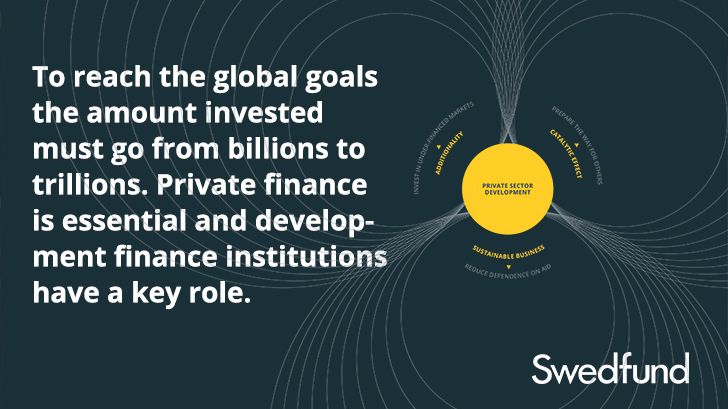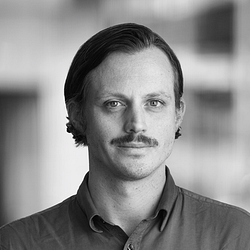
News -
Private finance essential to achieve the global goals
Our joint ability to mobilise finance is decisive if we are to achieve the global goals. The traditional sources of finance are insufficient: the amount invested must go from billions to trillions. This makes private finance essential.
Development finance institutions such as Swedfund have a key role: We invest where few others will, and we prepare the way for other financiers. And we develop sustainable businesses which, through their own operations and investments, contribute to achieving the goals.
In the past year, the International Community has clearly indicated that private investment is decisive in how quickly the global goals can be achieved. In this, Swedfund and other development finance institutions have a more important role than ever.
Development finance institutions are experts in assessing and reducing risk in complex investments. This means that our projects do not just generate profits in themselves, but also attract capital from other private investors. This catalytic ability means that development finance institutions act as accelerators for increased financing.
Inclusive growth on a broad front
Rooting out extreme poverty is at the heart of the global goals. Achieving this, requires inclusive economic growth. We know that a strong development of the private sector can rapidly lift a country out of poverty. This has already happened in Southeast Asia, and is happening in many countries in Latin America and Africa.
Economic growth gathers speed when decent work are created on a broad front. Then large parts of the workforce are included, and even the poorest are given the opportunity of employment and a better standard of living. In a global survey, ”Voices of the Poor”1, 70 percent of respondents stated that a job was the best way out of poverty.
Women and young people in focus
Giving women access to paid work is one way of accelerating development. A woman who is given a job in the formal sector lifts an entire family out of poverty. Every month, one million young people come onto the tough African labour market. Giving them a job does not just generate growth and reduce poverty, it is ultimately a matter of security. Unemployment creates alienation and instability, and is a breeding ground for violence and conflicts.
Finance and energy are key
At present, nine out of ten jobs in developing countries are generated in the private sector, with 80 percent of these in small and medium-sized companies. For these companies to grow and create even more jobs, it is essential that obstacles to business are removed, including lack of finance and inadequate energy supply. When companies have access to long-term and stable financing, they can grow more rapidly. And, in many cases, a reliable energy supply is a basic requirement for operating a business. If the global goals are to be achieved, it is essential that this energy supply comes from renewable sources such as solar, wind and hydropower.
Additionality on several levels
Development finance institutions can accelerate progress towards the global goals in a number of different ways:
- By being active in those countrieswhich have least access to capital.
- By investing in sectors, projects and market segments that do not easily get access to other private capital.
- By remaining active during periods of instability and recession, when other financiers withdraw.
- By being providers of finance who take a long-term view and have real staying power.
- By providing know-how and developing companies in all the dimensions of sustainability.
This is often referred to as the development finance institutions’ additionality: the ability to provide resources which otherwise would not have been available and which are crucial to development.
Additionally is also the word used to describe the value-creating work which akes place in the businesses. Not just financially but in all the dimensions of sustainability. Partly in the evaluation of the companies but also during the investment period. By making demands on the companies we invest in and by selecting projects which,for example, benefit gender equality, the climate and technological and energy development, we can influence development towards the global goals and help in achieving them more rapidly.
And, of course, there are synergies throughout: resource-efficient companies have lower costs, companies that practice equality are more profitable and decent working conditions make everything run more smoothly. Swedfund aims to accelerate this trend, so that we can achieve the goals, preferably before 2029.
1 Carried out by the World Bank during the 1990s, and summarised in a report published in 2002.

